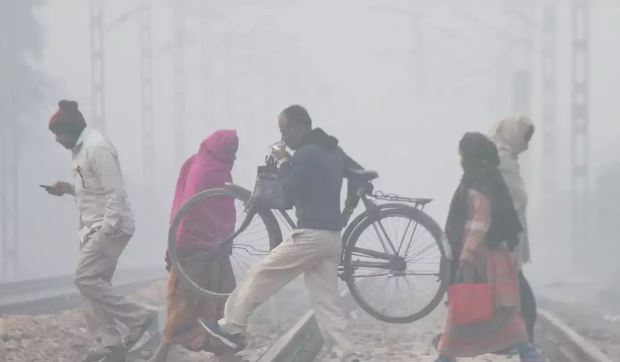North India continues to experience severe cold weather, with temperatures dropping sharply across several states. The Indian Meteorological Department (IMD) has predicted that the cold wave will persist over the coming days, accompanied by dense fog and worsening air quality.
Delhi Weather and Air Quality:
- The national capital recorded a minimum temperature of 7°C on Tuesday, with parts of the city blanketed by a thin layer of fog.
- On Monday, Delhi’s minimum temperature was 8°C, while the maximum reached 20°C.
- Air Quality Index (AQI):
- Tuesday morning: AQI at 401 (Severe).
- Monday morning: AQI at 403 (Severe).
- Key Locations:
- Alipur: 417
- Anand Vihar: 423
- RK Puram: 425
- ITO: 402
Residents lit bonfires and sought refuge in night shelters to combat the freezing conditions, while visibility in many areas remained poor due to fog.
Cold Wave Across States:
Rajasthan
- The cold weather disrupted daily life, with Bikaner recording a temperature of 9°C.
- Dense fog and cold wave conditions are expected to persist in Rajasthan until December 25.
Jammu and Kashmir
- Temperatures plummeted below freezing in several areas:
- Srinagar: -5.2°C
- Gulmarg: -0.6°C
- Pahalgam: -6.8°C
- Banihal: -0.8°C
- Kupwara: -4.6°C
- The IMD has forecast a severe cold wave in the region starting December 24.
Other Northern States
- Cold wave and dense fog conditions are also expected in Punjab, Haryana, Uttar Pradesh, and nearby regions from December 23 to 25, impacting visibility and transportation.
IMD’s Cold Wave Definition:
- Plains: Minimum temperature ≤10°C.
- Hilly Areas: Minimum temperature ≤0°C.
Impact on Daily Life:
- Dense Fog: Limited visibility, causing disruptions in traffic and transportation.
- Freezing Temperatures: People in affected regions are relying on warm clothing, heating sources, and community shelters.
Advisory:
Authorities urge residents to take precautions to stay warm, avoid unnecessary outdoor activities, and monitor updates from the IMD. Those with respiratory issues should limit exposure to outdoor air due to the severe air pollution levels.


